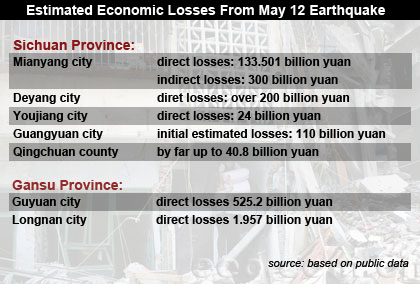


From News, page 3, issue no. 369, May 25, 2008
Translated by Zuo Maohong
Original article: [Chinese]
While China's Ministry of Finance (MOF) plans to adjust the 2008 fiscal budget, the State Council has established a 70 billion-yuan reconstruction fund and ordered a cut in central government's official spending by 5%. These measures are aimed at supporting reconstruction work following the May 12 earthquake.
Of the 70 billion yuan allocated by the State Council, 60 would come from the budget stability adjustment fund, said an official of the MOF's budgeting department.
In the aftermath of an 8.0-magnitude earthquake that struck Sichuan province on May 12, over 60,000 people have been killed to date, five million left homeless, and approximately 500,000 buildings damaged or destroyed.
On the afternoon of May 22, the 11th Standing Committee of the National People's Congress entrusted the State Council to adjust this year's budget, emphasizing that disaster relief work should come first and that the central treasury would give as much as was needed to rebuild.
The first concrete distribution schemes, such as what portions would be allocated for companies, schools, hospitals and government bodies, had yet to be drawn out, the MOF said.
In addition to these funds, the central treasury would arrange another 25 billion for disaster relief materials. The main source of this fund was a reserve fund traditionally known as the "premier fund" reserved for emergency use.
Spending of the premier fund could only be approved by the State Council and appropriation could only be made by China's premier himself. This year's premier fund totaled 35 billion yuan, the EO learned.
The funds had been tapped since the first day after the earthquake. "There isn't much left, because some has been used for the previous snow storm disaster," said an in-circle source who wished to remain anonymous.
Up to now, relief funds from the central government had totaled 10.295 billion yuan, compared with the 27.543 billion yuan for the snow storm disaster at the beginning of the year.
Stabilization Funds
Iinitially, the budget stability adjustment fund had been set up to cushion years of insufficient fiscal income or during serious fiscal emergencies.
Experts generally agreed the 60 billion-yuan rebuilding fund was consistent with this initial purpose. The stabilization fund was first established in 2007, when the central government had set aside 50 billion yuan for budget stabilization out of the 200 excessive fiscal returns of 2006. In 2008, this fund was increased to 100 billion. At the beginning of the year, 50 billion of this fund was drawn for general budgeting.
The standing committee of the National Congress held a discussion about the usage of the fund at the presidium meeting on May 22. Wu Bangguo, chairman of the Commission, noted that first priority should be given to relief efforts and to guarantee the lives of people in disaster zones, adding that Congress would grant as much as the situation demanded.
According to procedure, the use of the fund should be approved by the Commission, whose routine meeting would be held next month. Given the time-sensitive nature of the crisis, the Commission entrusted the State Council to draw from the fund in advance.
On May 22, Premier Wen Jiabao paid a second visit to the disaster areas in Sichuan and gave three instructions, namely, disaster relief, epidemic prevention, and secondary disaster preparedness - all of which require money.
Cut Official Spending
Apart from the relief fund, the State Council voluntarily proposed to cut 5% of the official spending for central government bodies to channel to relief works.
Budget for central government bodies includes staff payment and official spending on routine operation. The latter comprises of spending on office appliances, normal equipment purchase, electricity and water supply, mail and communications, heating, transportation, business trips, maintenance and rent, common charges, conferences, special operations, and other charges.
The actual sum of this 5% and how it should be spent were still under study by the MOF's budgeting department. By some experts' estimation, this fund should stand at several billion yuan.
The proposal was welcomed by the National People's Congress. There had been calls for less official spending to control inflation since last year, when debate over the economy first raged.
Treasury and taxation researcher Ma Chaichen, from Institute of Finance and Trade Economics under the Chinese Academy of Social Sciences, said the central government would be in much better position to cut official spending than local governments.
Ma explained that the official spending funds allocated for local agencies were usually lower, and if they were forced to cut such spending, they might resort to tapping project funding to cover necessary official spending.
According to the National People's Congress Financial and Economic Affairs Committee vice-chairman He Keng, it was unusual for the government to cut funding after an annual budget had been approved.
As far as he remembered, He said it was common for the government to provide additional budget as needs arose, but had never reversed or cut funding before.
Cutting official spending would also mean that the annual budgets needed to be re-adjusted, which would require a process of review in accordance with legislative procedure.

